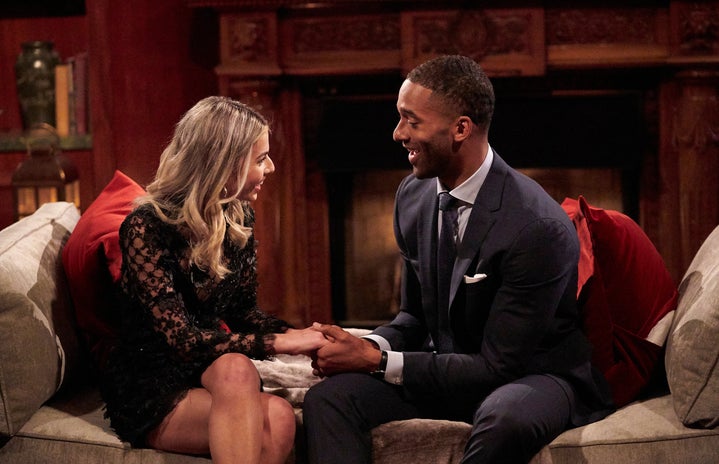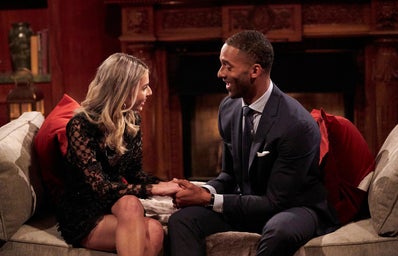Matt James’ season on The Bachelor has finished. The final rose has been given. Two(!) Bachelorettes have been announced. As far as anyone is concerned, Bachelor Nation is taking a break until Season 17 of The Bachelorette airs in the summer. All the loose ends are neatly wrapped up, and Matt James and his contestants are done and dusted with.
If only reality was that simple.
It’s not a coincidence that the latest season of The Bachelor, which featured the first Black Bachelor, has been a season marred by racist actions. By now, the saga has run the gamut of the news cycle.
Rachael Kirkconnell—James’ final rose recipient, who he has now broken up with—attended an antebellum party in 2018 (which had been banned by the fraternity, Kappa Alpha, in 2016 for being racist.) This was in addition to other past racist behavior, like dressing up as a Native American person, liking pictures of her friends with a Confederate flag, and allegedly bullying a girl in high school for liking black men.
Chris Harrison, the host of the show, went on Extra with Rachel Lindsay (the first Black Bachelorette) to defend Kirkconnell. After receiving an extreme amount of backlash, the executive producers’ response was to edit Harrison off parts of the show and replace him with Emmanuel Acho, author of Conversations With a Black Man, for the “After The Final Rose” special. Harrison will also be replaced for the next season of The Bachelorette with Kaitlyn Bristowe and Tayshia Adams, two former Bachelorettes, as hosts instead.
Yes, racism was discussed on this season of The Bachelor—but that doesn’t mean the franchise doesn’t have more to learn from its mistakes. In “After The Final Rose” (ATFR), James and Acho talked about the burdens that James faced as the first Black Bachelor. James discussed how any white lead would have simply been expected to fall in love, but he was supposed to represent Black people across the country and be a representative of social justice and Blackness along with his responsibilities as the Bachelor.
Acho—who most certainly played devil’s advocate for the white audience during the “ATFR”—followed a line of questioning that was frankly uncomfortable. “Don’t you believe she’s a different person now?” he asked James regarding Kirkconnell; “Couldn’t you teach her? Couldn’t you grow with her?”
This question posits the harmful notion that it is the responsibility of BIPOC to stay with and educate people who have committed racist actions, whether intentional or not, toward minority communities. It implies that it’s the BIPOC’s job to use their own energy to show white people why they’re wrong and be a guide for them along their journey. It deflects culpability from the person who’s committed racist actions themselves.
It’s unsurprising coming from a season that has been continuously framed against the minority contestants. Instagram account @bachelordata has been continuously posting statistics on the percentage of screen time that each person has received.
In a season that was 65.8 percent contestants of color, BIPOC contestants consistently received less than fifty percent of screen time per episode. In the first six episodes, the six contestants with the most screen time were all white and only one of them actually made it past the sixth episode. James’ final four were fifth, eighth, seventh, and ninth in terms of screen time allotted (listed in reverse elimination order.) Sarah Trott, a white contestant given the most screen time overall, left in Episode Three.
To quote @bachelordata, “The Bachelor executive producers gave us the most diverse cast. But they didn’t show them.”
So, what about next season? Typically, the Bachelorette is chosen from the final four of the previous season of The Bachelor. Three out of four were women of color: Serena Pitt, Bri Springs, and Michelle Young are all nonwhite, with only Rachael Kirkconnell being white.
Yet in early February (about halfway through the season), rumors began to circulate that Katie Thurston, a white woman who placed eleventh, would be the next Bachelorette. Although she would be the lowest–placing woman to ever become the Bachelorette, there was popular fan support due to the fact that she was the only one to comfort contestant Sarah Trott when other women insulted her on the show.
What wasn’t shown in the episode was that Springs and Kirkconnell were actually the first two to comfort Trott, according to Trott herself in an interview with EW. People speculated that producers were priming Thurston, a white woman, to be the next Bachelorette—ironic coming from a season that highlighted its record–breaking diversity.
On Monday, audiences were then shocked when it was revealed there would be two Bachelorette seasons in 2021: Season 17 led by Thurston, but also Season 18 starring Michelle Young.
There’s no evidence that the executive producers hadn’t planned on casting Young to begin with, but it’s important to remember that Bachelor Nation has not been kind with their casting in the past, with not a single Asian lead and only three nonwhite leads overall.
Matt James being the first Black Bachelor leaves the onus of racism on the show’s producers rather than individual scapegoats. The editing this season fleshed out white people’s storylines at the expense of BIPOC. Even after Rachel Lindsay was forced to go on a date with a racist during her season, The Bachelor continued to cast people with controversial racist pasts—often, Reddit easily uncovered their blatant racist actions, which makes it unbelievable that the producers of the show couldn’t do the same. Producers made a deliberate choice to cast eleventh–placing white women in main roles over the diverse final four.
It’s not coincidental that Matt James’ season of The Bachelor ended with him, a black man, being expected to comfort a white woman for the consequences of her own racist actions. Diversity is a selling point for The Bachelor, but never have we seen it be a focus—and at this rate, will we ever?


